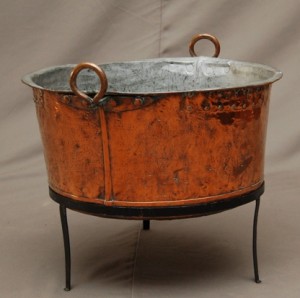Mondays was washing day. It was a big job and organisation was the only way to get everything done and still have time for everything else.
I had two large laundry coppers, like large round copper half barrels. Under one was a fire box, the other had no way of heating the water. Both coppers had a mangle on them. A mangle is a wringer, two tubes squeeze water out of the clothes when you turn the handle. To go with the coppers there was five large galvanized metal pails.
The coppers would be filled with water the night before so I didn’t have to haul all the water myself, and the buckets would be filled and stood in a line.
On a Monday morning I would light the fire under the hot copper. The children would have pulled the sheets and pillow cases off their beds and dumped them by the back door ready to be washed. After getting them off to school I would go up and make the beds and find any washing that had been left behind. All of it would get thrown down the stairs.
The bedrooms would be tidied and dusted and then the stairs swept on my way down. All the laundry at the bottom would be taken to the pile by the back door and sorted into piles.
I would check the heat of the water and when it was ready add some soap flakes and the least soiled of the light coloured pile of laundry. This would get bashed around by my dolly, a wooden pole with three smaller thicker rounded lumps of wood at the bottom of it.After a good bashing they would be put through the mangle. The clothes would be squeezed through the rollers and drop into the cold copper for rinsing.
The fire under the hot copper would be stoked if need be, and the next lot would go in, again the lightest and least soiled stuff.
After a couple of loads the rinse water gets a little soapy so a couple of buckets of water would be drained off and tipped into the hot copper. Fresh water from the pails would go into the cold copper. The clothes that were rinsed would be squeezed and hung out to dry, the line ran the length of the garden and was alongside the narrow path that lead down to the outhouse. The clothes were heavy and the line would be propped up high with a forked ended pole Ern had made.
If I came across anything with a stain I would give it a scrub before putting it in the wash and leaving it to soak awhile.
The last load would be work clothes and stuff that the boys had got really dirty. They would go into the hot copper and be left to soak. It could take quite a while to get heavy soil out so whilst they were in the wash I would go and clean the downstairs of the house before the children got home.
The evening meal on a Monday was always leftovers from Sunday, that saved a good deal of time. I would put whatever we were having on the range or in the oven and lay out the table for when they all came home starving.
Going back to the washing I would use the dolly again and then give the clothes a scrub before getting them rinsed and on the line. Often the first stuff pegged out would be dry so that would get taken inside and folded into one of two baskets, ironing and no ironing. I liked the no ironing basket to be full and the ironing basket to be empty but it never came out like that.
Washing done the water would be put onto the vegetables and the last pail would be used to rise out the coppers, with that watering the veggies as well.
Ern and the boys would bring the coppers back into the scullery when they got home, which was usually within an hour of me finishing the laundry.
This way of doing things worked very well when the weather was good, but on wet days the scullery would be an inch deep in water and there would be wet washing everywhere. On days like that we had to dry it indoors, on wooden airers that we stood in front of the range. It often took two full days and nights in winter to get it all dry.
When I watch the modern washing machines whizzing around I am amazed how they can do in an hour or so what used to take me a full day, and then some if it was wet.
I would have really liked to have had a washing machine life would have been very much easier with a washing machine. That said what I really would have liked to have is fabric softener, I think fabric softener is a wonderful invention, our clothes were often hard and scratchy, especially when they were dried by the fire.
We were lucky though. We had the coppers, many folks had to stoop over a regular tin bath and they often never had a mangle, now that really would have been hard work.
Regards
Maud
This article was originally published at Ready Nutrition™ on May 22nd, 2014







